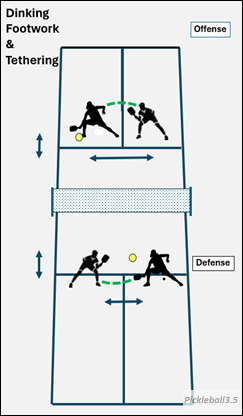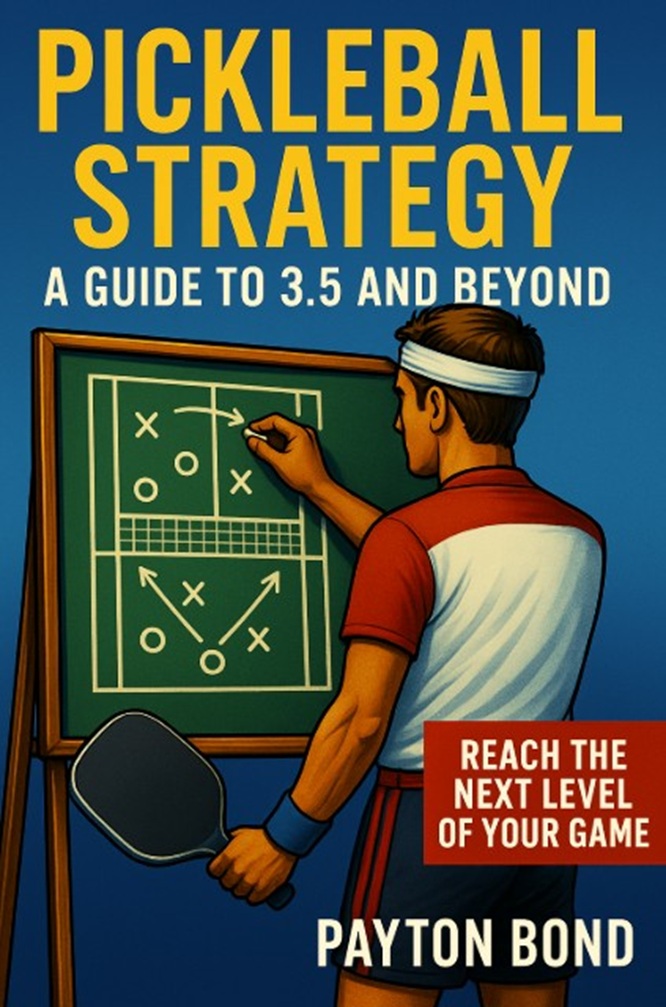
Dinking Footwork and Tethering
Dinking footwork and tethering are the unsung heroes of pickleball. Mastering these skills can make or break your performance in dinking rallies. With experience, your footwork will naturally improve, and staying tethered to your partner will become instinctive
Shuffle and Stay Connected
To excel at dinking, you’ll need smooth footwork and a strong connection with your partner—because no one wants to be the player who leaves a gaping hole in the defense.
At the 3.5+ level, players know the secret: shuffle like you mean it and keep your tether tight. That connection with your partner is the invisible thread that keeps your defense airtight and your opponents guessing.
Dinking Footwork and Tethering Techniques
- Shuffle Smartly: Glide along the kitchen line using a shuffling motion. No crossing your feet—this isn’t a dance floor (though it might feel like one during a long rally). Staying balanced is key to making those quick, controlled responses.
- Step In, Step Out: If the ball dares to drop into the kitchen, step in with one foot to play the shot, then step back out like you weren’t even there. Quick and clean.
This illustration shows players tethered together, moving side to side and in and out of the kitchen as needed.

Good footwork and tethering are essential for successful dinking rallies. Always move in sync with your partner as you slide side to side along the kitchen line to play your dink shots.
When your partner shuffles over to reach a dink, you should shuffle with them—it’s a team dance, not a solo performance. If you lose that connection and leave a gap, your opponents will pounce on the opportunity like it’s a free buffet, driving a speed-up dink straight into the opening. Stay connected, and don’t give them the satisfaction!
Kitchen Line Dinking Drill
Why It’s Important:
This drill helps you fine-tune your footwork at the kitchen line, improving your ability to make quick, small adjustments and stay positioned for soft shots.
How to Do It:
Have your partner feed dinks to either side of you. Shuffle side to side to reach the ball while staying close to the kitchen line and maintaining balance. Dink the ball back so they can feed another shot to the opposite side. This drill sharpens your lateral movement and keeps you light on your feet for quick reactions.
Key Focus:
Small, controlled shuffles are crucial. Stay balanced, low, and ready to adjust smoothly to each dink.
Dinking Game
If you have a free court and some time to spare, spice up your practice with a dinking game. Play singles with a partner or doubles with four players, two per team.
How It Works:
- For singles, use half the kitchen; for doubles, use the entire kitchen.
- Set a goal of 5 or 10 points.
- Alternate sending dinks across the net, scoring a point when your opponent hits the ball out of bounds, out of the kitchen, or into the net.
Miss a shot? Award the point and resume play with the person retrieving the ball. As you play, aim your dinks at tricky spots on the court to challenge your opponents’ returns.
This game adds a fun, competitive edge to your practice while helping you sharpen your dinking accuracy and strategy.
Summary of Footwork and Tethering
Pickleball footwork and tethering are critical during dinking rallies. Always stay connected to your partner, shuffling in sync to avoid leaving openings that your opponents will happily exploit. Solid teamwork and sharp footwork are the keys to dinking success!
Check out Payton Bonds new eBook!
Pickleball Strategy – A Guide to 3.5 and Beyond
See it on Amazon.

👤 Follow Payton Bond
All Star and Top Contributor on multiple Facebook Pickleball Forums.
Contributor at TheKitchenPickle.com.
Visit Payton Bonds Facebook Page
Keep Learning
- Watch the video 🎥 below on Dinking Form and Technique
- Read the next post in the Dinking series: Pickleball Cross-Court Dink – Why It’s Your Best Dinking Option
🎥Video on Dinking Form and Technique
Courtesy of Dick’s Sporting Goods
Watch this video on Dinking Form and Technique on Youtube.

